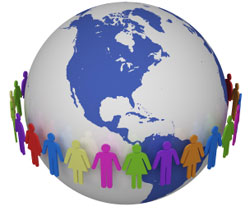 Wednesday, May 18, 2011 at 10:07AM
Wednesday, May 18, 2011 at 10:07AM For a bit of context, here is the reader's question:
"Do you think complete recovery is possible? It seems that a lot of people place eating disorders in the always in recovery/never healed category of mental health. I would like to think it is possible, but, personally, I tend to agree with those who doubt complete recovery. I notice that it takes a lot of effort to not fall into my old ways- I am healthy weight wise, but mentally I still seek control through food."
One of the reasons that I felt compelled to address this issue is because I believe that the way we think about recovery and view recovery can have a massive impact on how hopeful we feel for our friends, loved ones and ourselves who may be suffering, as well as how effective we can be in moving forward. (Think self-fulfilling prophecy- if you don't think recovery is possible, then you won't likely be motivated to act in ways consistent with recovery, and you will probably feel pretty hopeless.) As a fun way of exploring this topic on my blog, I thought it would be interesting to compile responses from people and professionals in the eating disorder field that I highly respect. It is no surprise that I was welcomed with extremely insightful and thought provoking responses. Below are some of the responses that I received to this question that I posed: "Do you think that it is possible to fully and completely recover from an eating disorder? Or is eating disorder recovery more similar to something like remission?"
"I believe eating disorders are a completely treatable brain disorder and that patients can and should live without symptoms if their community, family, and clinical team work together to intervene firmly and using sound science and compassion. I believe we should settle for nothing less than FULL remission of medical AND mental symptoms. But I also believe that the predisposition remains, even if there are no cognitive or emotional or behavioral symptoms. For that reason someone with a history of an eating disorder needs a lifelong relapse prevention plan. 'Remission' is a word that some people misunderstand as meaning the person lives constantly with a battle to be well, but I define remission as fully well with a risk of relapse. I find this way of looking at an eating disorder-- as a treatable brain disorder and not a choice or failure-- very optimistic. I think of recovered patients as having done heroic and laudable work, and then applaud them and their support."
- Laura Collins, author of Eating With Your Anorexic, Director of F.E.A.S.T. (Families Empowered and Supporting Treatment of Eating Disorders) and parent activist.
"I believe in complete recovery though it may take a long time and require lots of resources and effort, but it is worth it. To protect recovery, one must not jeopardize it by dieting, over exercising, criticizing one's body, but instead focus on developing and supporting a clear unapologetic sense of self. I wouldn't be in this work if I didn't believe in complete recovery. My own recovery solid now for nearly 40 years still inspires me."
- Dr. Marcia Herrin, author of Nutrition Counseling in the Treatment of Eating Disorders and The Parent's Guide to Eating Disorders, founder of the Dartmouth College Eating Disorders Prevention, Education and Treatment Program, and a nutritionist in private practice. She also blogs for Gurze (here) and Psychology Today (here)!
"Rather than use the words 'completely' and 'fully' to talk about eating disorder recovery, I prefer the word functionally. A person is functionally recovered though they still may occasionally have eating disordered thinking (upon which they don't act) or even sometimes eat in a mildly disregulated way. They're functionally recovered when they generally and automatically practice 'normal' eating behaviors and hold a healthy attitude about food and weight.
-Karen Koenig, LCSW, M. Ed., therapist, motivational speaker, and author of The Rules of Normal Eating
"After 35 years of recovery and 32 years in the field treating eating disorders I have no doubt that full recovery is possible. Once I recovered I used my self as an example, then over the years I had many former patients become recovered, then more, and then I started meeting recovered people all over the country and then the world. I am talking about 10, 15, 20 and 30 years of being recovered, not just one or two. Full recovery is possible and no one can take this away from those of us who know that our illness is a thing of the past. Once something like this has really been healed there is no going back. This illness is legitimate but it does also have an element of choice involved unlike, say, leukemia. I will never make the choice to restrict my food, weigh my self esteem or starve myself again. I am recovered and I know it like I know the sun will come up tomorrow."
- Carolyn Costin, educator, therapist, founder of Monte Nido and its affiliates (Rain Rock, Monte Nido Vista and the Eating Disorder Center of California), lecturer, author of Your Dieting Daughter, The Eating Disorder Sourcebook and 100 Questions and Answers About Eating Disorders, and Gurze blogger (here!).
I hope these little 'sound bites' on recovery have been encouraging and thought provoking ...! I have more to post, and will be doing so in the next few days! :)








